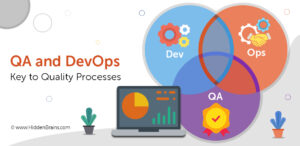Quick Summary
Discover how DevOps and QA work hand-in-hand to deliver faster, more reliable software. This guide explains their connection, from continuous testing to automated pipelines, helping teams catch bugs early, improve collaboration, and ensure high-quality releases every time.
It is an era of highest level of application performance, consistent availability and stability. Development turnaround and time to market is getting shorter. DevOps and agile are the key to success and the latest buzzwords. There is mounting pressure on testing teams to quickly and thoroughly test applications, as well as support a wide variety of devices, operating systems, and browsers without sacrificing quality and speed of delivery.
With the upcoming trends and technologies in the IT industry, the need to effectively understand, manage, and adopt the QA activities are continually increasing. Agile and most recently, DevOps is changing software development and giving ways to enforce QA.
With the software development cycles getting quicker and faster than ever before, the onus of keeping up with the pace lies on QA teams. It is a daunting challenge, and QA teams are overcoming this challenge with optimized processes, quality-centric processes, and higher productivity.
Implications of QA with the dynamics of DevOps
DevOps encourages the culture of collaboration to help increase communication and cooperation between the organizational silos across the Development and Operations Team to deploy code to production. This also relates to the QA organization and their development counterparts. DevOps is all about helping expediting knowledge sharing, experience, and specialized skills to deliver quality systems. In the era of DevOps, QA teams will be more geared towards preventing defects rather than finding them.
Challenges faced by QA teams
QA Culture: When it comes to DevOps it is all about how the change is conducted. This mainly requires a shift in the organizational culture, as well. It is imperative and challenging to think of innovative ways of identifying unique techniques to test the software quickly and efficiently.
Facilitation of quality: When it comes to DevOps, the QA team should analyze and decipher the business of the system being verified. It requires a collaborative approach with business experts and developers to understand the system being tested and how it supports different business functions. QA teams will not function if not involved in initial discussions. It is this involvement that helps QA to become the facilitator of quality.
Collaboration: QA amalgamates development and operations. It needs to be involved right from the word go and not be an afterthought. This will allow to collaborate and have the software developed and supported adequately. It is a joint responsibility of the entire project team, rather than the responsibility of a dedicated QA team.
Preventive Approach: The approach is about identifying errors even before they occur in the development cycle. To get in a preventive mode, it is crucial to start the testing phase from a very early stage of the development cycle. QA should begin testing the code even if the features are not complete. This requires maturity in documenting self-sufficient user stories that do not depend on another for testing. It is recommended to use automated testing for smoke tests. As DevOps encourages frequent builds, there are chances that the possibility of code breaking current features. For this reason, it is feasible for testers to verify manually.
Top DevOps Testing Tools
White Source Bolt
- WhiteSource Bolt for Azure DevOps is a free extension to secure open source components in Azure DevOps to identify and fix vulnerabilities, as well as detect vulnerable components & fix recommendations.
- Fully integrated into your Environment and provides all the data in your Azure DevOps environment.
- Automated Inventory Reports to provide a full list of all open source libraries and their licenses.
- Get patches and version updates to follow the fix instructions within the vulnerabilities table.
Jenkins
- Effective tool for DevOps engineers seeking to sustain a CI/CD pipeline and automate builds.
- Jenkins embeds with Git source control repositories such as GitHub and permits to automate builds, fetch the code and continuously offer new facilities.
- Allocate tasks through various machines thereby enhancing concurrency.
- Inherent GUI device for hassle-free updates.
- Improve infrastructure’s level of automation.
- Nearly 400 plugins to assist and handle virtually any project.
- Continuous delivery and integration.
Gradle
- Gradle is a building device to allow users to code in Python, Java, and C++ along with other languages.
- Gradle is 100 times faster than Maven in processing. The development in speed is because of Gradle’s daemon and because it has a more advanced cache.
- Kotlin-powered DSL for customers to avoid the learning curve.
Nagios
- Nagios is an open source device coded in C language.
- It is practiced in application maintenance, server regulation, and network surveillance.
- While regulating the network, it supervises routers, network connections, switches, and other necessary hardware.
- It offers two procedures on server monitoring, namely, agentless and agent-powered.
- Assist in maintaining Linux, Windows, and UNIX along with web applications.
Vagrant
- Vagrant permits creating and regulating virtual machines in a single workflow. Vagrant creates a user-friendly workflow and emphasizes automation.
- It assimilates with current configuration management devices like Puppet, Chef, Chef, Salt, and Ansible.
- It works flawlessly on Linux, Window OS, and Mac.
- Develop a single file for projects to explain the sort of software, and machine users want to mount.
- Vagrant assists DevOps team professionals to have an ideal growth ambiance.
Hire Managed Testing Services and benefit from professional QA
When quality is your ultimate goal, it is important to partner with Managed QA services provider. With qualified QA professionals, streamlined processes, as well as the latest DevOps testing tools, processes, you can be rest assured of efficiency and consistency in all phases to address major testing challenges and achieve optimum quality.
Frequently Asked Questions
Wondering how QA fits into DevOps pipelines? Check out these simple answers to the most common questions teams ask.
What is the role of QA in DevOps?
QA ensures software quality throughout the DevOps lifecycle. By integrating testing early and continuously, QA helps teams detect issues faster, improve reliability, and deliver bug-free applications more efficiently.
How does DevOps improve QA processes?
DevOps automates testing, deployment, and feedback loops. This allows QA teams to run tests continuously, identify defects early, and collaborate closely with developers, reducing delays and improving overall software quality.
What are the benefits of combining DevOps and QA?
– Faster release cycles with continuous testing
– Early defect detection and reduced production issues
– Improved collaboration between development and QA teams
– Enhanced software quality and customer satisfaction
Which tools are commonly used for QA in DevOps?
Popular tools include Selenium, JUnit, TestNG for automated testing; Jenkins and GitHub Actions for CI/CD pipelines; and SonarQube for code quality analysis. These tools help integrate testing seamlessly into DevOps workflows.
How does continuous testing fit into DevOps?
Continuous testing runs automated tests at every stage of the development pipeline. It ensures immediate feedback on code changes, helping teams fix issues before they affect production.
Can DevOps work without QA?
While possible, skipping QA increases the risk of bugs, delays, and failed releases. QA is essential for maintaining high-quality standards, even in fast-moving DevOps environments.
How does DevOps QA benefit businesses?
Integrating QA in DevOps improves reliability, speeds up releases, reduces costs from post-release defects, and enhances customer satisfaction. It ensures software is delivered faster without compromising quality.
Conclusion
QA in DevOps can play a critical role in accelerating development and release schedules. DevOps helps overcome some of the QA challenges and enable the QA team to take their deliverables to the next level. In DevOps, testing is a continuous process and supports the process of incorporating continuous feedback to enable better quality.































































































![Sales & Distribution [Oil & Gas] Sales & Distribution [Oil & Gas]](https://www.hiddenbrains.com/blog/wp-content/themes/blankslate/assets/images/sales_and_distribution-icon.74d08193.svg)

![Fluid Terminal Management [Oil & Gas] Fluid Terminal Management [Oil & Gas]](https://www.hiddenbrains.com/blog/wp-content/themes/blankslate/assets/images/fluid_terminal_management-icon.4b3a27a4.svg)































![Sales & Distribution [Oil & Gas] Sales & Distribution [Oil & Gas]](https://www.hiddenbrains.com/blog/wp-content/themes/blankslate/assets/images/sales_and_distribution-icon.74d08193.svg?1.0.0)
![Fluid Terminal Management [Oil & Gas] Fluid Terminal Management [Oil & Gas]](https://www.hiddenbrains.com/blog/wp-content/themes/blankslate/assets/images/fluid_terminal_management-icon.4b3a27a4.svg?1.0.0)
























































































































































































